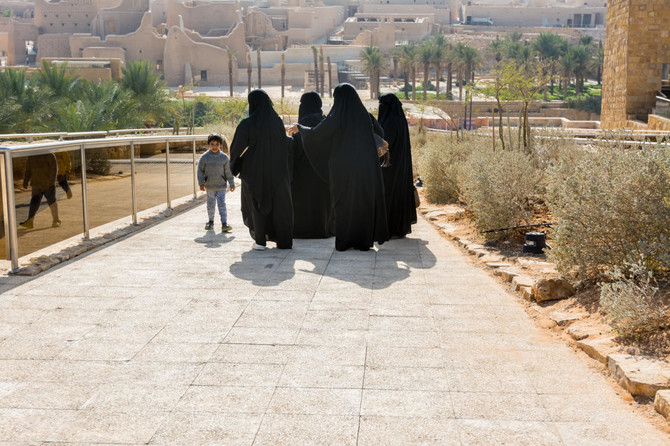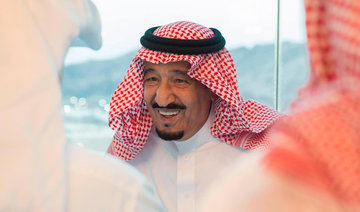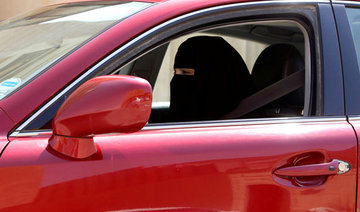JEDDAH: A new anti-harassment law has won praise from across Saudi Arabia after King Salman ordered the interior minister to criminalize sexual harassment.
The government has prepared a draft anti-harassment law to be implemented in 60 days, with jail terms and flogging being considered as possible penalties.
The move comes just days after a royal decree lifted the driving ban on women.
The latest royal decree stated that sexual harassment posed a great threat to women and families, and was “in contradiction of Islamic principles.”
The decree read: “Considering the dangers sexual harassment poses and its negative impact on the individual, the family and society along with its contradiction of Islamic principles, our customs and traditions … the ministry shall prepare a draft law to tackle sexual harassment.”
The move drew a very favorable reaction from Saudi society.
“The order of King Salman is good and laudable. It will definitely give protection to women ... from harassment by men,” said Khalil Al-Jehani, a practicing lawyer in the Saudi capital.
He added that the order is a further show of support for women after the decree lifting the ban on women driving.
In a 2014 study, nearly 80 percent of women aged 18 to 48 said they had been exposed to some form of sexual harassment.
Faisal M. Al-Mashouh, a lawyer and legal adviser, said the law would “be a road map to control existing relations in society and protect the rights of women.”
He said the law is “a qualitative leap for the rights of women in Saudi Arabia,” adding that in the past, they took a backseat in decision-making and were passive participants in nation-building. This is no longer the case, he said.
Women “have become members of the Shoura Council so their voice on vital issues is heard. They’ve also become heads of leading local corporations,” he said.
The new law will give women more self-confidence and courage to pursue their goals and be active participants in nation-building, as envisioned in Vision 2030, he added.
Many women took to Twitter to express their support for the new law, overjoyed at the prospect of more freedom and safety.
Farah Al-Jabr tweeted that she finally felt like a “human being.”
Maha Al-Fahad was overwhelmed at the events of the past few days, tweeting: “OK … If this is a dream, don’t wake me up.”
Others took the opportunity to ask for the reopening of cinemas as the next step.
Mueerah Al-Ibrahim said this week “was the most beautiful, historic week ever,” with @stgirlever tweeting: “Women driving: done. Anti-Harassment law: done. Cinema: soon. Please welcome the new Kingdom of Saudi Arabia.”
Saudi society welcomes new law criminalizing sexual harassment
Saudi society welcomes new law criminalizing sexual harassment

Saudi Arabia extends condolences to Sudan after 11 die in mine collapse

- The collapse of the gold mine in the remote desert area of Howeid, northeast Sudan killed 11 miners and wounded seven others
RIYADH: Saudi Arabia extended its condolences and sympathy on Sunday after a traditional gold mine in Sudan partially collapsed and killed 11 miners.
The collapse of the gold mine in the remote desert area of Howeid, northeast Sudan also wounded seven others, the country’s mining company said on Sunday.
The Foreign Ministry said the Kingdom stands with Sudan during this tragedy and wishes the injured a speedy recovery.
Jeddah panel explores declining marriage rates among youth

- Discussion highlights changing views on commitment, societal pressures, search for meaningful connection
JEDDAH: Amid changing values, shifting priorities and growing alternatives to traditional partnerships, a panel titled “Why is there a decline in marriage today?” has explored evolving views on love, commitment and marriage.
Organized by Ta3mq, a platform focused on honest dialogue, the event at Hayy Jameel’s Rukn Space in Jeddah featured panelists from psychology, community leadership and youth engagement.
It was moderated by Tasneem Alshanqiti, Ta3mq founder, and Motaz Al-Safh, a Saudi engineer and entrepreneur. The session addressed generational concerns, fears and new definitions of partnership.

Reflecting on her role, Alshanqiti said: “I wasn’t just moderating — I was carrying the voice of younger women,” adding that she aimed to create a safe space that encouraged openness and reflection.
Panelist Rozana Albanawi, founder of Qeema and Jeddah_CM, said that the discussion explored marriage from societal, religious and psychological perspectives, focusing on self-understanding, compatibility over idealism, and the evolution of love.
Al-Safh said that he focused on creating a safe, judgment-free space for men to express vulnerability.
He described the conversation as “more like a talk between brothers than a formal panel,” aiming to help participants understand their fears and feelings about love and commitment.
The discussion highlighted recurring themes among Saudi youth. Al-Safh said that a few key issues kept emerging: Fear of failure, feeling unready, and pressure from expectations. Many question whether marriage today feels like love or a liability.
He added: “But beneath it all, there’s a real craving for connection, just done right, in a way that feels safe and meaningful.”
Dr. Khalid Sindi, a relationship and marriage psychotherapist, offered a broader national perspective by linking personal challenges to policy and social change.
Speaking to Arab News, he noted the ongoing transition in Saudi marriage values — from traditional to more modern — while emphasizing the preservation of core Islamic principles.
He highlighted government efforts under Vision 2030, such as the Saudi Marriage Fund and Sakani housing program, aimed at easing economic barriers for youth.
Sindi added: “Younger generations are seeking marriages that blend our cherished traditions with contemporary expectations of emotional connection and mutual growth. This represents not a rejection of our values but their natural adaptation to modern life.”
The panelists said that changing views on love and commitment reflected maturity rather than uncertainty.
Albanawi said: “There is high awareness among the generation now on marital topics, and many are seeking marriage with the right tools.”
She explained that conversation and dialogue help young people to commit while accepting uncertainty in relationships.
“The younger generation is looking for new ways to shape their marriage, such as avoiding unnecessary rules like high financial burdens or societal expectations that don’t match their reality.”
On the event’s outcome, Albanawi added: “A common theme was that marriages work best when couples marry early, are ready, and have family support.”
She noted that many believe delaying marriage increases fears and makes adaptation harder.
Sindi expressed a similar view on marriage’s evolving nature, saying that the changing views reflected progress and natural generational dynamics rather than fear or uncertainty.
“Rather than seeing shifting perspectives as problematic, the older generation should guide younger Saudis with wisdom and empathy.”
Highlighting the national context, Sindi noted the vital role of government initiatives in supporting Saudi Arabia’s vision for marriage and family life, demonstrating a commitment to making families society’s cornerstone.
Reflecting on the session’s emotional honesty, Al-Safh said that hearing men express concerns such as, “I don’t want to fail someone’s daughter,” revealed deep care often left unspoken.
Alshanqiti echoed the need for open, non-judgmental spaces, saying fears about failure and not being enough reminded her that many seek places where they can be truly seen and heard. She described the session as a step toward that openness.
Global sculptures at open-air museum in historic Jeddah

- The sculptures form a dynamic dialogue between the past and present, blending the site’s heritage with the language of contemporary art
JEDDAH: As part of a broader effort to revive the region’s visual identity through art, Al-Arbaeen Lake in historic Jeddah has been transformed into an open-air gallery featuring a curated collection of sculptures by international artists.
Led by the Ministry of Culture in cooperation with Jeddah Municipality, the initiative features 14 world-class artworks integrated into the city’s visual landscape, Saudi Press Agency reported.

The sculptures form a dynamic dialogue between the past and present, blending the site’s heritage with the language of contemporary art.
Notable works on display include “The Illusion of the Second Cube” by Hungarian-French artist Victor Vasarely; “Rouge” and “Flexibility of Balance” by Alexander Calder; “Circular Mass” by Arnaldo Pomodoro; “The Bird” by Spanish sculptor Joan Miro; and “Giving and Receiving Love” by Lorenzo Quinn — a powerful piece that reflects human values through striking aluminium forms.
FASTFACTS
• Led by the Ministry of Culture in cooperation with Jeddah Municipality, the urban art initiative features 14 world-class artworks integrated into the city’s visual landscape.
• Notable works on display include ‘The Illusion of the Second Cube’ by Hungarian-French artist Victor Vasarely and ‘Giving and Receiving Love’ by Lorenzo Quinn.
The installations are part of a wider artistic movement that reimagines public spaces as platforms for cultural engagement.
By transforming urban environments into art experiences, the project invites both residents and visitors to explore the intersection of architectural heritage and modern creativity.
It underscores the growing role of art in shaping urban identity and fostering public appreciation for visual beauty in shared spaces of the Kingdom.
Saudi FM receives Djiboutian counterpart

- The two sides discussed bilateral relations and ways to enhance cooperation in various fields
RIYADH: Saudi Foreign Minister Prince Faisal bin Farhan received his Djiboutian counterpart, Abdul Kader Hussein Omar, in Riyadh on Sunday.
During the meeting, the two sides discussed bilateral relations and ways to enhance cooperation in various fields, the Foreign Ministry wrote in a post on X.
The two ministers also chaired a meeting of the Political Consultations Committee between the two countries, during which they discussed coordination on key regional and international issues.
Saud Al-Sati, deputy minister for political affairs, was among the officials in attendance.
Saudi FM receives written message from Russian counterpart

- Al-Khuraiji and Kozlov elaborated on relations between their countries and ways to enhance them in various fields
RIYADH: Saudi Foreign Minister Prince Faisal bin Farhan received a written message from his Russian counterpart Sergey Lavrov, Saudi Press Agency reported on Sunday.
The message, regarding Saudi-Russian relations and ways to support and strengthen them in various fields, was received by Deputy Foreign Minister Waleed Al-Khuraiji in Riyadh during a meeting with Russia’s ambassador to the Kingdom Sergey Kozlov.
During the meeting, Al-Khuraiji and Kozlov elaborated on relations between their countries and ways to enhance them in various fields. Topics of common interest were also discussed, SPA added.























